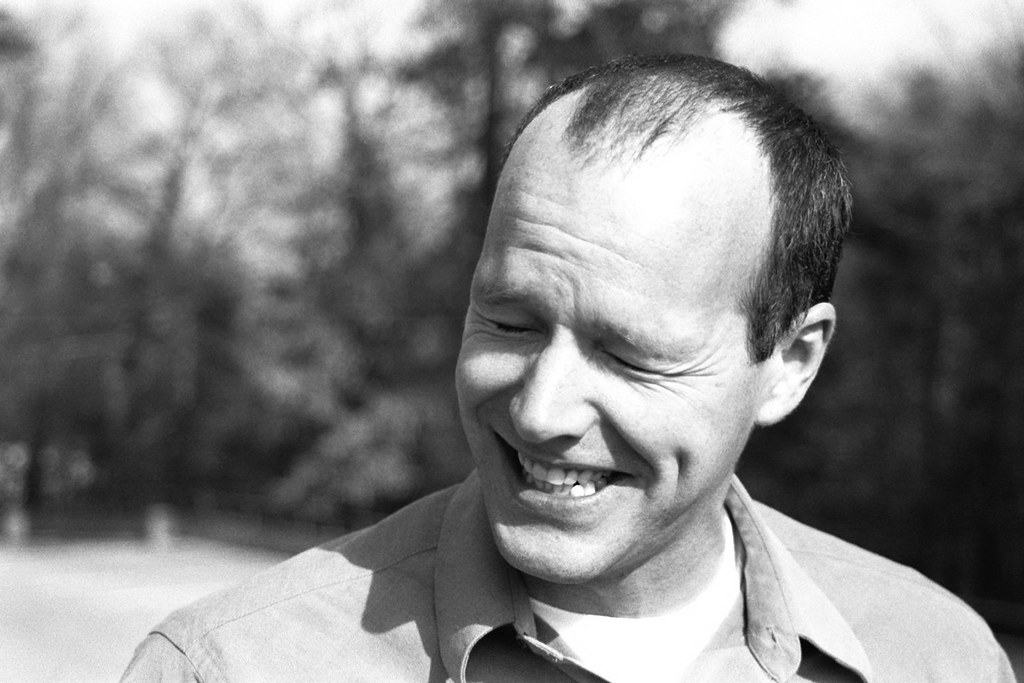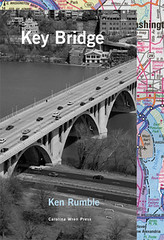Please spread far and wide.........
Who: Cole Swensen, Finalist for the 2004 National Book Award in Poetry for her book
Goest, author of 9 other collections of poetry, translator of some of the best of contemporary French poetry, a faculty member at the Iowa Writers' Workshop, also famous for building a life-size model of Big Ben out of America Online CDs.
Who: Chris Vitiello, author of
Nouns Swarm a Verb, survivor of the Lucipo roadshow, rumored to be the head of a theatre group whose existence is itself rumored to be a rumor.
What: Desert City Poetry Series, when you care to hear the very best.
When: This Saturday, February 19th, 8:00pm, 2005.
Where: Internationalist Books, 405 W. Franklin Street, Chapel Hill, North Carolina.
Why: "I've / always / wanted / said the painter // and so he did" "Am I supposed to write that it rained? // One, two, three, four, five, six // What rained?"
See you there.......
Next Month Two Readings:
March 19th: Tara Rebele & Brian Henry
March 26th: Kent Johnson & Patrick Herron
*Internationalist Books
*Cole Swensen*Chris Vitiello Contact the DCPS: Ken Rumble, director:
rumblek at bellsouth dot net
"TRILOGY"
by Cole Swensen
One
I
The guard peers closely
at the painting. Count.
The fingers. The figures. The
strange sweep from waist
to chest to head. His hand reaches out
within a second of
II
She sweeps upward. Up
to where the gold sky might
What would the touch
if it did not first
run up against
a man who is in the end a man
III
She touched the painting
as soon as the guard
turned his back. Respond.
I said turn around. I
screamed, I drowned, I
thought you were home.
I touched the surface of the canvas.
It was I, the sound of salt. And fell
and is still falling through a silent earth.
Two
I
A deep red in the sky that has nothing
to do with the season but quiets
Outside drinking coffee and wine and watching.
Look, he's speaking, leaning over to his
neighbor.
Look how the lines around his eyes and mouth.
Fleet. Part. What of that. Replies.
II
She crosses the square in a bright red coat.
Look how they look at her, look up
from their talking. There is no thought
here of leaving. There is no thought.
There are people crossing the square
arm in arm, in threes and fours and alone in great numbers.
III
Joseph Albers, THE INTERACTION OF COLOR, 1975. I've heard
that no one is ever repeated or ever precisely named.
She took the coat off the peg.
Even to herself, she said it was her own.
She crosses the square on her way home.
She will not stop at a cafe, she will not talk, she will just go home.
Three
I
The minute progressions between grey and black
becoming one against the red that stares back.
Because she knows they are watching, she will not turn around.
Home is a sound repeated to solid, to something that will hold.
Look, there goes a man with his left hand left lightly
on the head of his child. There they go.
II
In the painting, all the reaching hands are growing.
In the gallery, everything was green and gold and red
Made the sun, though deep, cut through:
Within the door was a window; within the window, a jar.
Inside the jar, carefully there, the love need not be
assigned in order to fix and ignite.
III
She had to cross the square in order to get home.
She was one. And one by one, they looked up and watched.
When the guard turned around, the gesture was gone.
A woman stood back and said no.
She stood back, looking at the painting and said isn't it fine
that a woman wearing red could arrive at a gold sky. Remind.
Or else in falling. And nothing broke. The rift
shifts open the devout. A finger that exceeded number, a
fingertip.
from
Irresponsibilityby Chris Vitiello
Late November into early December 2004 Shenandoah, VA Harrisonburg, VA Springfield, VA Washington, DC Durham, NCGrackles bathe where the drainage
terminates // Typical pull // Pulling so into
// Between
the low Winter Sun and me
Before the low Winter Sun, their splashes
illuminate
He leaf-blows in church clothes
There really are grackles
Grackles splash a fray
in the drain divot pool behind
which the Sun sets // Position makes this
appearance // Giving
up is never correct
The whitespace goes negative // Choice of negation
Event-specific sets of by what
The oak leaves appear brassy
Undoing aperçu
The grate has sunken askew // Here’s why // Gerunds
are now
That school addition is unornamented and, in backlit
shadow,
flat
Shuttle
Iris and Gracie console imaginary horses
A storm threatens // They argue
beneath a lopsided oak
Win it word by word is problematic
Carriage returns
Cadiot: I will do something to someone
The school building rear
looks like a factory contains
also is a factory // Is
Not an implication but a container
His behavior appears portioned and metaphorical
to me as
if he thinks he is being read
A container contained by what it contains
What’s in Firdos Square now?
Argument is the game
It
Grackles bathe and drink in
a drainage pool
Winter Sun setting linear behind
These 2 things, but 1 thing
Making an argument is a surface
Exploitation instructs
This coat does nothing
I know that the dogwood is completely red though I cannot see
it from here
Arafat’s dead // So’s Michelle
“What’s different now?”
versus “Can it be unwritten?”
Only the parts of his body move that
he needs to // He does 1 thing
Miles Davis: “Paraphernalia”
The grackles, the water, their splashing, the sunlight
through the splashing
I’m in the plenum too
Iris and Gracie try the swings again
is experience-determined duration
This book is set in 12-point type
I wonder if I’m still alive
The container, the surface, the contents, the
whitespace, the characteristics, the durations attached to these
Hocquard: Does writing allow someone to see better?
And the words, obviously
Pursuit is pushing and we have
those 2 words // Little gravelly hill
is one way of saying
little gravelly hill
Thank you Hocquard
Once demarcated, how different should/could the items be?
He makes shit and carbon-dioxide
The saturated soil sank so unintentional berm
(As I write this) Iris tells Theresa to say “No, no it isn’t”
// Theresa says it
Geometric equipment and what isn’t?
Cobra is a system not a composition
Albiach: would their word be transmitted
That lopsided oak likely lost its crown in ice storms
Vicki and I married and Rabin was assassinated
Iris guesses pronunciation at vowels
A signal is a sub-signal < This with this
or this without this
Returning to the grackles is
different from returning to Firdos Square // One symmetry
displaces another
Royet-Journoud: eye pursues its prey / shelters behind
another phrase
The Fallujah offensive is replay and slow-motion
at here // Bettis’s subtlety
Is it information or does it contain information?
Evie’s rectangle
The coverage of the taxi explosion
shows the exploded taxi
Until she gets it right
Nothing elapses at now
Vicki calls from earlier in time
The cartoons did their jobs and were declared heroes
The magical rain brings the tree to life
Neither vacuum nor plenum is a negation
I’m getting tough // Poetry is invisible
The red dogwood leaves hang directly at the ground
in angled clusters around the base of the
nude depleted buds
The Periodic Table lapses into abominations
One name is as good as another
Amber’s detachment
Minimal and essential, snakes
The projector completely blocks the light source
between each frame
Nothing’s haphazard and I don’t expect
the dots to be connected // Iris says
“The pinks almost rhyme”
Snakes do
not elaborate
Sunset is a lie
By naming the suspension of judgment you
are missing the point
There were no single grackles // The understood it
Grackles is singular
Each dogwood leaf is mottled with blacks, browns,
and reds // Veins
are yellowish implies the green they were in Spring
White, dried blotch perimeters
Lack of end-punctuation is a characteristic //
Characteristic has of
I agree they’re red
They were probably starlings
It turns out
The noun is a process
I can see three flags from here
Her remote control trees all on the same frequency
Devendra Banhart: “Nice People…”
One thing is not any thing
Vicki moved and everything moved // Vicki moved everything


